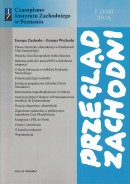Formy samorządu korporacyjnego w Polsce – dwadzieścia lat doświadczeń państwa demokratycznego
Forms of Corporative Self-Government in Poland – Twenty Years of Experience of a Democratic State
Author(s): Robert KmieciakSubject(s): Politics / Political Sciences
Published by: Instytut Zachodni im. Zygmunta Wojciechowskiego
Summary/Abstract: One of the biggest achievements of the process of the socio-political transformation in Poland is a vast decentralization of the sphere of public power. From the perspective of administrative law, decentralization is understood as a system in which there is a large number of independent centres equipped with public and legal competences and one main centre. Decentralization is therefore a procedure of transferring certain public functions so far restricted to the competence of the central government to groups of citizens organized as corporations. The object of the analysis presented in the article is corporative self-government grounded in the union of persons with obligatory membership. Corporative self-government which exemplifies decentralization is not a one-dimensional notion referring only to territorial relations. An essential role in the system of representing the interests of particular milieus falls to special self-government which is set apart by other criteria. According to this division, within the special self-government we further distinguish trade self-government and economic self-government. The article emphasizes the fact that the success of the Polish self-government reform will be complete only when there is a harmonious development of all the forms of corporative self government irrespective of the character of bonds between their members. As legal entities, self-governments will then be in the service of democracy and will strengthen the civic society.
Journal: Przegląd Zachodni
- Issue Year: 341/2012
- Issue No: 01
- Page Range: 43-68
- Page Count: 26
- Language: Polish

